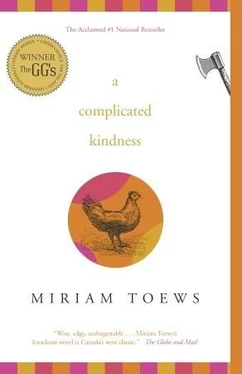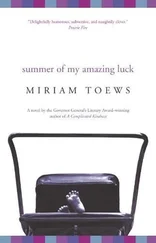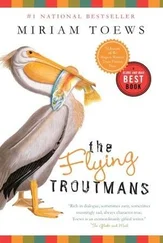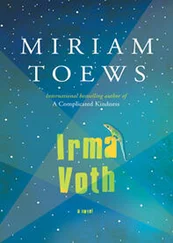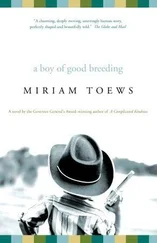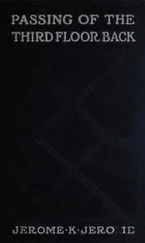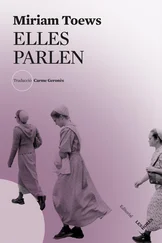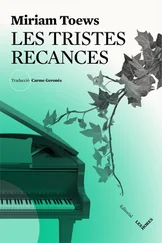Do you have to go back? I asked.
Yeah, he said, soon.
Please don’t be happy with that girl, I said.
He said okay, he wouldn’t be.
He told me I looked like Alice Cooper. We got up and he put his arms around my waist and held me like we were a long-time couple with my head on his collarbone and his chin on my head.
I went to the general store and bought a long stick of orange candy from a woman in a black dress. She said she hadn’t seen me in church lately. I know, I said. I’m sorry. And I was sorry.
When she looked at me she saw a child surrounded by flames, screaming. And that must have been hard for her.
I didn’t want to leave right away. I liked stores, the way people came and went and looked at things. I asked her how her day was going and she said it was almost over. She was tired. I nodded and smiled again. And it’s so hot in here, I said. Oh, I have a fan behind the counter. She pointed at it.
That’s not authentic, is it? I asked. She smiled shyly.
I mean I don’t think it’s a sin or anything, I said.
Oh goodness, I hope not, she said. We both laughed a little.
Nomi, she said. May I make a suggestion? I said of course she could. May I suggest you start with Matthew? she asked.
That’s probably a good idea, I said. Thank you. She seemed so happy then. I felt good about sticking around and talking to her. I wanted what she had. I wanted to know what it really felt like to think you were saving someone’s life.
How’s your dad? she asked. How’s school?
They’re doing carbons, I said. And thermodynamics. His beloved Second Law. She shook her head.
He’s hooked on extremely unstable carbons, I said.
Ohhhh, she said.
And entropy.
Is that right? she asked.
Yup, I said.
Wow, that’s interesting, she said.
In a way, I said. We nodded together in kindly clued-out unison.
May I pray for you? she asked.
Of course, I said. I thanked her and said goodbye.
I walked down Kokomo Road to the pits and waded into the water. I floated around in all my clothes sucking on my candy with my eyes shut. I left when I heard some cars pull up and guys get out and start smashing things and girls with them saying no, don’t, no, don’t. I didn’t feel like going home so I went to Abe’s Hill and sat on top of the toboggan shelter making designs on my legs with the navy-blue water dripping from my cut-offs and waiting for the city lights to come on.
When I was five my favourite book had no words, only colours. The first page was black — that’s what my heart looked like without Jesus in it. The second page was red. That was Jesus’ blood washing over me and saving me, somehow, and the third page was white which meant my new clean heart and the fourth page was gold which was the colour of the streets in heaven where I’d live forever and ever and ever and ever and ever and ever and ever and ever and ever and ever and ever and ever and ever. In Sunday school our teacher would hold up the pages of the book and point at each one with her long index finger that poked out from a sleeve that she’d stuff used Kleenex into and we’d recite in this dirge-like monotone the meaning of all the colours. Then it was felt-board time. We were not allowed to put anyone but the felt Jesus onto the old rugged cross, and we could not do voices for the characters because it always ended in Jesus leaping from the cross and drop-kicking the bad guys.
One day, at home, I scratched a mosquito bite until it bled and I held it against the page of Jesus’ blood and his was orangey in comparison, which spooked me. I took a pin and poked the tips of all my fingers trying, with increasing desperation, to find a shade that matched the blood of Jesus. No dice, my blood was wrong. Tash found the book in the bathroom garbage covered in bloody fingerprints and made this huge deal out of it because I wouldn’t tell her what I’d done.
They threw my mother out. Gave her the old heave-ho. The term is excommunicated. She was excommunicated, said my dad.
Ah, I said. I nodded. I’d heard that story before.
That’s pretty much that, he said. The townspeople were expected to rally around the church and cut her off in their own special way. There were different methods. Silence was popular.
The Mouth and the other elders and the deacons and lay people had met for a good seven or eight minutes before they decided that Trudie was history.
I don’t know how she felt about it. I never had the chance to ask her. I have this vague picture in my head of my mother sitting on my bed and looking at me. I think her hand was on my arm and she was wearing a black turtleneck sweater and she was just staring at me. I think she was smiling the same kind of real smile that Tash had smiled just before she left. It’s a scary smile. It’s a smile that means there is nothing left to lose. That you are free, according to Janis Joplin. I looked right at her for a couple of seconds but it was dark and I don’t know if she noticed. She moved her hand up and down my arm, slowly, and then I heard her begin to cry very softly and I buried my face deep into my pillow because I didn’t want to hear her cry. And then I felt her hand on my head and the next thing I knew she had closed my door quietly and was gone.
I hadn’t known then that she had left for good. But in the morning my dad was standing in the middle of the living room, looking out the big picture window at the highway, and he didn’t move all day. And he didn’t speak and he didn’t eat. He just stood there in his dark suit with his necktie all done up and everything and his hands in his pockets, moving his change around. That was the only sound all day, the sound of coins clanking against each other.
I know that after my mom was gone my grandma’s drinking got worse. She made up her own wild tales. My dad told me that she had told him once that she’d been entombed in concrete for several days and managed to survive. She told him that when The Mouth was born she’d been so happy. He was the most beautiful baby, she said, but he took everything so literally. I could never engage him in whimsy.
Well, said my dad. What else could he say? I honestly don’t think he hates The Mouth. Mr. Quiring said that ideologies were to blame for most of the world’s problems, not individuals. What could The Mouth do but throw his sister out? What a colossally ridiculous mess.
Then one day, maybe a month or two after Trudie left, I was walking around downtown and I saw Mrs. Klippenstein sitting in front of the Rest Haven in a wheelchair with a blanket over her legs and a red wool toque on her head. I asked her if she was visiting and she said no, she lived there now, her kids had finally won the argument.
I remembered Trudie racing around the house, getting ready to go to Mrs. Klippenstein’s. Almost every other day, after supper, she’d throw her gauze and tape and ointment into her kit, clap her hands and say all right, I’m off! See you later! Where’d she been going if Mrs. Klippenstein was living at the Rest Haven and not alone in her house needing medical care?
How long have you been here? I asked Mrs. Klippenstein. She shook her head. Then she gripped the metal bars of her wheelchair and stared off into the distance.
Take me Lord, make me new, she said. I asked again and she did the same thing. Take me Lord, make me new. Take me Lord, make me new. I eventually walked away.
Trudie was gone. My dad and I were alone. We did our best to live — you know, we ate, we slept, he worked, I went to school. I started doing all the laundry. Sorting it into colours, breaking it down into loads, washing, drying, folding, and putting it away. I decided to use my mom’s drawer for some of his stuff, for his socks and underwear and handkerchiefs. So first of all I emptied the drawer of her things including that passport with her photo, the one where she thinks her eyes are hazel, and the letters from Mr. Quiring.
Читать дальше
